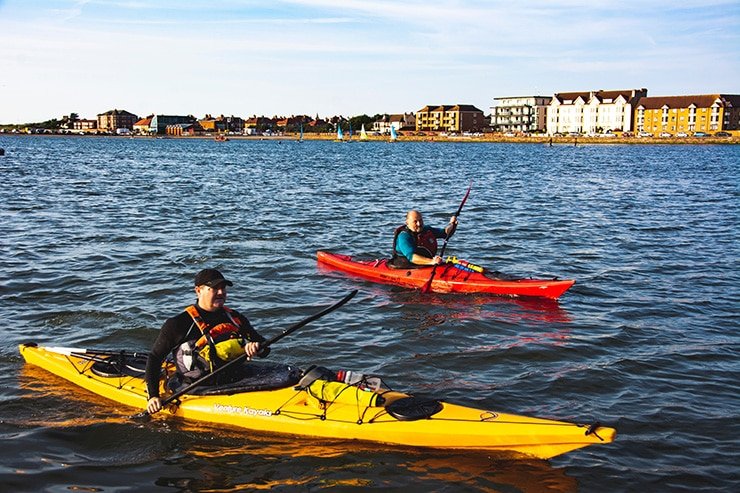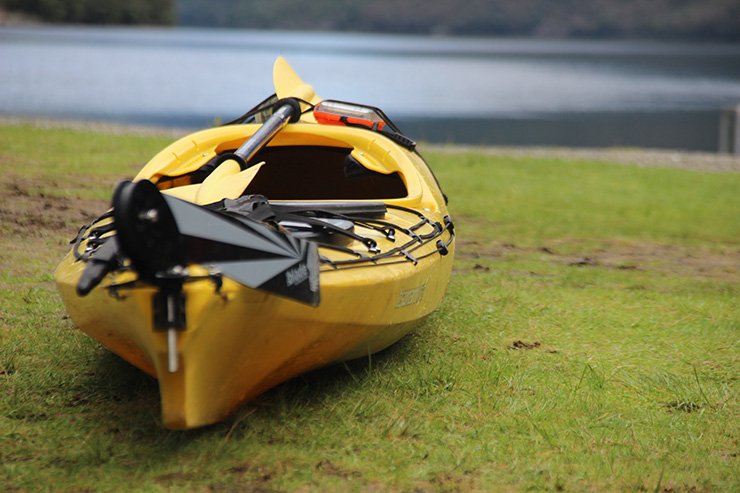When it comes to kayaks, there’s usually some confusion concerning their classification. Water vessels come in all shapes and sizes–from large cruise and cargo ships to rafts, paddle boards, and kayaks.
Smaller vessels like kayaks have their own classification; they’re definitely not ships, but are kayaks boats? Knowing how water vessels are classified is important because you need to know how the law views your vessel.
So, is a kayak considered a boat? What boating laws, if any, apply to kayaks?
The short answer is, technically, a kayak is considered a boat in most cases. And in many states, many boating laws extend to kayaks as well. So let’s dive into the details of what type of watercraft a kayak is.
RELATED: Kayaking Rules and Regulations Every Kayaker Needs to Know
Key Takeaways
- A kayak is a boat by definition, but not all boating laws apply to it in every state or jurisdiction.
- You may need to register your kayak as a recreational boat if it is longer than a certain length or has a trolling motor attached.
- Some boating regulations that kayakers have to follow include wearing a PFD, carrying visual distress signals, and avoiding reckless operation.
- You may be subject to boating under the influence law (BUI) if you operate your kayak while intoxicated.
Is a Kayak a Boat?

Yes, a kayak is a boat by definition. In fact, the term “kayak” translates to “hunter’s boat” or “man’s boat.” Additionally, the history of modern-day boats starts with canoes and kayaks made using wood, animal skin, and other materials that were available in prehistoric times.
The term “boat,” on the other hand, usually refers to watercraft of different shapes and sizes–from kayaks and canoes to bigger fishing boats.
Going by the definition, things seem pretty straightforward. But that isn’t always the case, especially regarding the law. Some jurisdictions may consider kayaks to be boats, while others may not.
Is a Kayak a Personal Watercraft?
According to the US Coast Guard, personal watercraft or PWC is a small vessel primarily propelled by an inboard jet drive, and the operator kneels, stands, or sits on the vessel and not within a hull. Jet Ski is a popular PWC type, and it has become a generic term for all types of PWCs.
By this definition, kayaks are not considered personal watercraft.
Kayaks Vs Paddle Boats

A paddle boat usually refers to a small human-powered boat propelled by rotating pedals with your feet. It’s also known as a pedal boat in the United States.
Sometimes, people may use the term paddle boat to refer to any kind of paddle craft, including canoes and kayaks.
Do I Need to Register My Kayak and Get a Boating License?
By general definition, a kayak is a type of boat. But as mentioned, the more critical issue is how the law views your vessel. As they say, “ignorance is no defense,” so you wouldn’t want to be caught unaware.
That said, all states require you to register your boat and have a boat license. In some states, this includes kayaks (sometimes even inflatable kayaks). In Ohio, for instance, all recreational boats have to be registered, and they put kayaks under that category.
Some states will exempt your kayak only if it is strictly human-powered. If you add a trolling motor, which is common with fishing kayaks, you must register it. Alaska is a good example.
In other cases, the length of your kayak will determine whether you have to register it or not. Minnesota requires registration for kayaks over 10 feet long. All sea kayaks fall under this category as they tend to be on the longer side.
So as you can see, it all comes down to your local boating regulator. Check the boating registration laws in your areas to see whether a kayak is considered a boat that requires registration.
Boating Laws That Apply to Kayaking

Boating license laws don’t apply to kayaks in all states. However, there are other boating regulations that extend to kayakers, and failure to meet them may land you in serious trouble.
One of those is the boating under the influence law (BUI). Like driving under the influence (DUI), operating a boat while intoxicated is illegal. The penalty can be up to a year in jail or fines of up to $5,000, depending on the specific local laws. Kayaks are exempt in a few states.
PDF laws also include all water vessels, including small watercraft like kayaks. Federal law requires you to have a PFD for every person on your kayak, and children under 13 must wear their life jackets.
All water vessels on coastal waters must have visual distress signals and day signals if they are longer than 16 feet. Other states will require a horn and a bilge pump if your vessel is not self-bailing. These are safety equipment items that will come in handy should you find yourself in a bad situation.
Another important boating law that applies to kayaking is the reckless operation rule. It’s illegal to operate your boat recklessly, which puts a person’s life, property, or limb at risk.
Many fishing laws for boats also extend to kayaks. The wise thing to do would be to check your local government laws and see what requirements you need to meet so you don’t put yourself and other water users in danger. Or land into some legal trouble.
Frequently Asked Questions
Is a Kayak a Boat or a Ship?
A kayak can be more accurately described as a boat. Ships are typically much larger than boats.
What’s the Difference Between a Kayak and a Boat?
Kayaks are a type of boat, but they are a little different from the “typical boat”, that is, a motorboat.
Boats are bigger and more spacious. They can accommodate multiple people with enough space to walk around. Kayaks are smaller, and there isn’t much room for moving around. You can’t even stand in some kayaks.
A boat is much more expensive to buy and maintain. Once you buy one, you’ll need to spend more money on fuel, insurance, launch fees, and other costs. A kayak is cheaper to buy and maintain.
Another difference is the kind of access that each vessel offers. A kayak is narrower and it allows you to navigate tighter spaces and shallower waters that are not accessible by motorboat. A motorboat lets you travel farther and faster so you can cover more ground.
Is a Kayak a Boat or a Raft?
A kayak is more of a boat. It’s a canoe-shaped vessel used for transport and recreation. A raft, on the other hand, is larger and flatter, designed to accommodate more people.

Conclusion
So, is a kayak considered a boat? Yes, by definition, a kayak is a boat, and the term “boat” refers to a wide range of large and small water vessels. But more important is how your local government views it because you don’t want any legal problems.
In some states, and even according to federal law, there are boating laws and regulations that apply to kayaks. These include PFD laws, some navigation rules, and safety regulations, among others. A few states also require you to register your kayak as it is considered a recreational boat.
There may be exemptions, depending on the length of your kayak and whether or not you use a trolling motor. You may want to go through your state boating laws as well as USCG laws to see what applies to your kayak.

